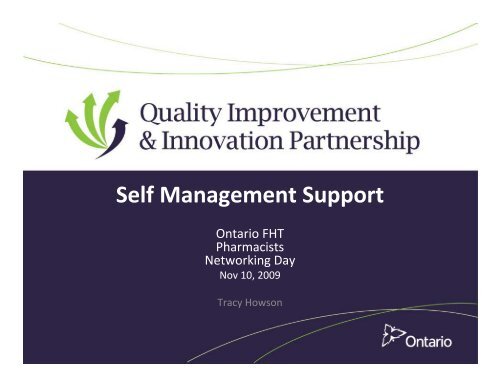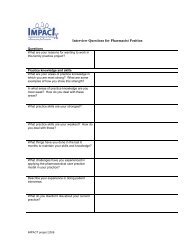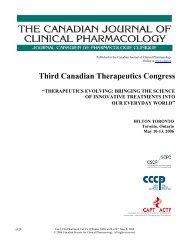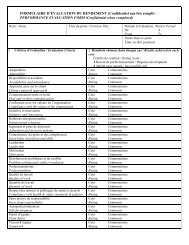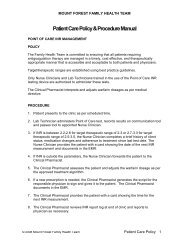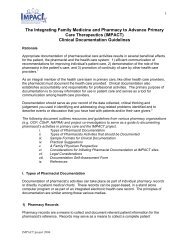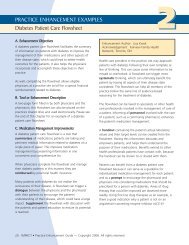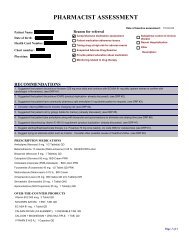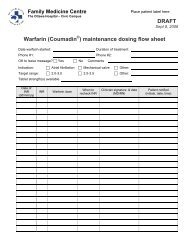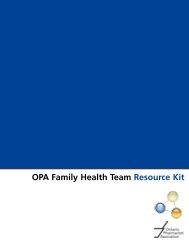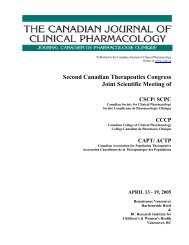Self-management Support: Getting from me to we... - Impact
Self-management Support: Getting from me to we... - Impact
Self-management Support: Getting from me to we... - Impact
You also want an ePaper? Increase the reach of your titles
YUMPU automatically turns print PDFs into web optimized ePapers that Google loves.
<strong>Self</strong> Manage<strong>me</strong>nt <strong>Support</strong>Ontario FHTPharmacistsNetworking DayNov 10, 2009Tracy Howson
MissionThe Quality Improve<strong>me</strong>nt and Innovation Partnership will bethe provincial leader in quality improve<strong>me</strong>nt <strong>me</strong>thods forprimary healthcare.VisionOntario’s primary healthcare system will be recognized asproviding exemplary primary healthcare driven by acommit<strong>me</strong>nt <strong>to</strong> continuous quality improve<strong>me</strong>ntGoalTo advance the develop<strong>me</strong>nt of a high performingprimary healthcare system.
<strong>Support</strong>iveEnviron<strong>me</strong>ntsOntario’s CDPM Fra<strong>me</strong>workHealthyPublicPolicyINDIVIDUALSAND FAMILIESPersonalSkills & <strong>Self</strong>-Manage<strong>me</strong>nt<strong>Support</strong>HEALTH CAREORGANIZATIONSCommunityActionDeliverySystemDesignProviderDecision<strong>Support</strong>InformationSystemsProductive interactions and relationshipsActivatedcommunities &prepared,proactivecommunitypartnersInfor<strong>me</strong>d,activatedindividuals& familiesPrepared,proactivepracticeteamsImproved clinical, functional and population health outco<strong>me</strong>s4
24‐Hour Diet &Exercise ChallengeWhat did you eat and drink yesterday?BreakfastSnackLunchSnackDinnerSnackBedti<strong>me</strong>How <strong>we</strong>re you physically activeyesterday?5
Changing <strong>from</strong> <strong>me</strong> <strong>to</strong> <strong>we</strong><strong>Self</strong> Manage<strong>me</strong>nt <strong>Support</strong>
‘Chronic Disease’ Patient Contact with HealthProfessionals(Diabetes, Arthritis, Lung/Heart Disease)Ti<strong>me</strong> spent over 1 year:• GP visits per annum = 1 hour• Visits <strong>to</strong> specialists = 1 hour• Nurse, PT, OT, Dietitian = 10 hoursTotal = 12 hours• 364.5 days managing on their own or 8748 hoursBarlow, J. Interdisciplinary Research Centre in Health, School of Health & SocialSciences, Coventry University, May 2003.7
Definitions•<strong>Self</strong> Manage<strong>me</strong>nt◦ Actions taken by patients in caring for chronicconditions (e.g. taking <strong>me</strong>dications, exercise,managing functional limitations)•<strong>Self</strong> Manage<strong>me</strong>nt <strong>Support</strong>◦ Actions by health care providers that strengthenand support self <strong>manage<strong>me</strong>nt</strong>
People with chronic illness who are able <strong>to</strong> selfmanage their disease are likely <strong>to</strong> moreappropriately use health care services, havefe<strong>we</strong>r disease related complications, andexperience greater quality of life and betteroverall health than those who do not selfmanage their condition• Bycroft & Tracy, 2006• Chodosh, Mor<strong>to</strong>n, Jojica et al 2005• Decoster & Cummings 2005• National Health Priority Action Council 2006
The problem (with Physicists ) is not that <strong>we</strong>can not learn ‐‐‐it is that <strong>we</strong> can not forget.Werner HeinsbergChanging a paradigm
Patient Education v.s.<strong>Self</strong>‐Manage<strong>me</strong>nt <strong>Support</strong>Disease focusedPatient EducationEducation on how <strong>to</strong> managesymp<strong>to</strong>ms of chronic conditionEducation on how <strong>to</strong> managedisease <strong>to</strong> reduce impact on lifeTreat<strong>me</strong>nt goals and changesdetermined by HCPPatient educated <strong>to</strong> comply withtreat<strong>me</strong>ntHCP moni<strong>to</strong>rs patient outco<strong>me</strong>s andrecom<strong>me</strong>nds changes <strong>to</strong> therapy<strong>Self</strong>-Manage<strong>me</strong>nt <strong>Support</strong>Patient focused<strong>Support</strong> on managing stress andemotional impact of condition<strong>Support</strong> on how <strong>to</strong> improve lifestyle <strong>to</strong>minimize impact of diseaseLifestyle goals and changes chosenby patientPatient supported <strong>to</strong> make actionplans <strong>to</strong> <strong>me</strong>et goalsPatient supported <strong>to</strong> self-moni<strong>to</strong>r and<strong>to</strong> modify changes <strong>to</strong> action plans
VideoCoaching Patients forEffective <strong>Self</strong> Manage<strong>me</strong>ntAugust 2008California Healthcare FoundationTom Bodenhei<strong>me</strong>r, MD
1. Problem Solving2. Decision Making3. Resource Utilization5 Core <strong>Self</strong> Manage<strong>me</strong>ntSkill components4. Forming a productive Patient Health CareProvider Partnership5. Taking Action –making action plansIf a program does not include 3 of 5 then it can not becalled “self <strong>manage<strong>me</strong>nt</strong> support” (Wagner)
<strong>Self</strong> Manage<strong>me</strong>nt ApproachesIndividual– 5 As– Health Promoting Process– Flinders Model– 3 Minute Empo<strong>we</strong>r<strong>me</strong>ntGroup Approaches– Stanford (peer led)– NHS
<strong>Self</strong>‐Manage<strong>me</strong>nt <strong>Support</strong> Interventionsare Varied & Comple<strong>me</strong>ntaryGroup ProgramsStanford University Chronic Disease <strong>Self</strong>-<strong>manage<strong>me</strong>nt</strong> ProgramNHS’ Expert Patient Program1:1 Empo<strong>we</strong>r<strong>me</strong>nt CounsellingNP/ Physician VisitHo<strong>me</strong> Care Nursing VisitFollow-upBy Health Professional or Lay Staff/ VolunteerFace <strong>to</strong> FaceTele-moni<strong>to</strong>ring & Telephone CallInternet e.g. Patient Portal15
Making it your ownQuality improve<strong>me</strong>nt
Measure<strong>me</strong>nt is critical <strong>to</strong> improve<strong>me</strong>ntModel for Improve<strong>me</strong>ntWhat are <strong>we</strong> trying <strong>to</strong>accomplish?How will <strong>we</strong> know that achange is an improve<strong>me</strong>nt?What change can <strong>we</strong> make thatwill result in improve<strong>me</strong>nt?ActStudyPlanDo
The SM one minute Challenge<strong>Self</strong> Manage<strong>me</strong>nt <strong>Support</strong>Quality Improve<strong>me</strong>nt
• At least one thing you are going <strong>to</strong> do,• Address the envelop where you want it<strong>to</strong> be sent• Seal it, no one else will read this• I will mail it <strong>to</strong> you in the next few <strong>we</strong>eksImproving your practiceThe Envelop, please!
PLANOne thing you are going <strong>to</strong> test, that you believe is achievable____________________________________________________________________________________________________________________How long are you going <strong>to</strong> undertake the test?When are you going <strong>to</strong> do this?1 pt/1 min/1 hr?_________________________day of the <strong>we</strong>ek, ti<strong>me</strong> of the day?__________________Is there anyone else you need <strong>to</strong> recruit?__________________________Measure: How will you know if the change is an improve<strong>me</strong>nt?___________________________________how confident are you? 1...2.…3.…4...5….6...7....8....10?DO_____________________________STUDY__________________________________ACT__________________________________
Measure, improve, <strong>me</strong>asure
Resources <strong>to</strong>ol box:• Books and Docu<strong>me</strong>nts– Partnering in <strong>Self</strong> Manage<strong>me</strong>nt <strong>Support</strong>: A <strong>to</strong>olkit forClinicians (IHI)– Chronic Physical Illness: <strong>Self</strong> Manage<strong>me</strong>nt and BehaviouralInterventions , 2009, edited Newman, s., Steed L., Mulligan– <strong>Self</strong> Manage<strong>me</strong>nt in Theory and Practice; a guide forHealthcare Providers (www‐self<strong>manage<strong>me</strong>nt</strong><strong>to</strong>olkit.ca)• Websites– SWLHIN– www.<strong>Self</strong><strong>manage<strong>me</strong>nt</strong><strong>to</strong>olkit.com– CELHINhttps://www.healthylifeworkshop.ca/Ho<strong>me</strong>.aspx?PageID=46&mid=_ctl0_MainMenu__ctl1‐<strong>me</strong>nuItem010‐subMenu‐<strong>me</strong>nuItem000– <strong>Impact</strong>BChttp://www.impactbc.ca/practicesupport/practicesupportmodules/patientself‐<strong>manage<strong>me</strong>nt</strong>– Optimizing Healthhttp://www.optimizinghealth.org• Courses– <strong>Self</strong> <strong>manage<strong>me</strong>nt</strong> <strong>to</strong>ol kit <strong>we</strong>bsite modules– Optimizing Health Conference November 24, 25, 2009– Beco<strong>me</strong> a Stanford peer leader– <strong>Impact</strong> BC modules• People– Kate Loring– Patrick McKo<strong>we</strong>n– Tom Bodenhei<strong>me</strong>r– Mike Hindmarsh
Improving Chronic Illness Care ‐ Chronic Care Modelwww.improvingchroniccare.orgCalifornia Health Care Foundation (videos)www.chcf.orgBrief Negotiation Roadmap ‐ Kaiser Permanente(online tu<strong>to</strong>rial)http://kphealtheducation.org/bnroadmap/index.htmlQuality Improve<strong>me</strong>nt and Innovation Partnershipwww.qiip.caStanford Universityhttp://patienteducation.stanford.edu/programs/cdsmp.htmlNHS Expert Patients Program<strong>me</strong>http://www.nhs.uk/conditions/Expert‐patientsprogram<strong>me</strong>‐/Pages/Introduction.aspxMoreLearningResources23
http://www.self<strong>manage<strong>me</strong>nt</strong><strong>to</strong>olkit.caWith Companion literature –<strong>Self</strong> Manage<strong>me</strong>nt in Theoryand Practice: A guide forHealthcare Providers
Go <strong>from</strong> here?Take the Ti<strong>me</strong> it Takes, so it takes less Ti<strong>me</strong>• 1. Recom<strong>me</strong>nd reviewing the resources, highly recom<strong>me</strong>nd mining,http://www.self<strong>manage<strong>me</strong>nt</strong><strong>to</strong>olkit.ca• 2. Allow yourself <strong>to</strong> do test of change/ pdsas, building your skill and your patientsability <strong>to</strong> self manage, it is a life long journey ‐‐‐• 3. And if you can, participate as a patient in a Stanford CDSM program workshop.Not <strong>to</strong> necessary beco<strong>me</strong> a peer leader but <strong>to</strong> really understand and walk in theshoes of your patients, so you can beco<strong>me</strong> a better partner
Questions
www.qiip.ca


